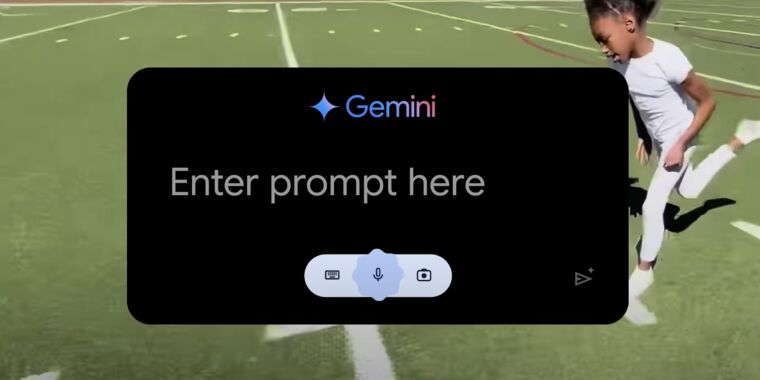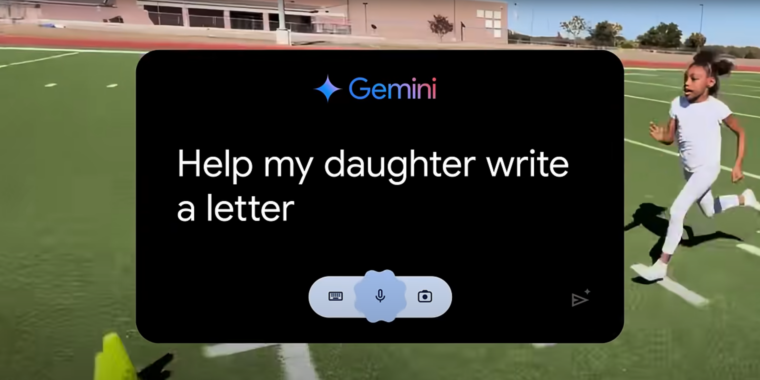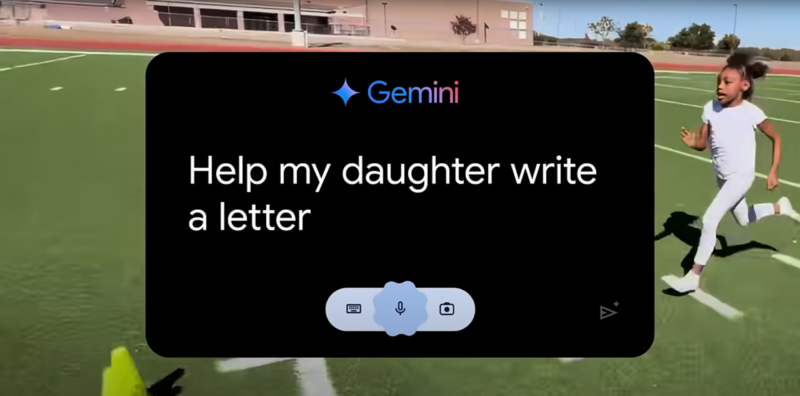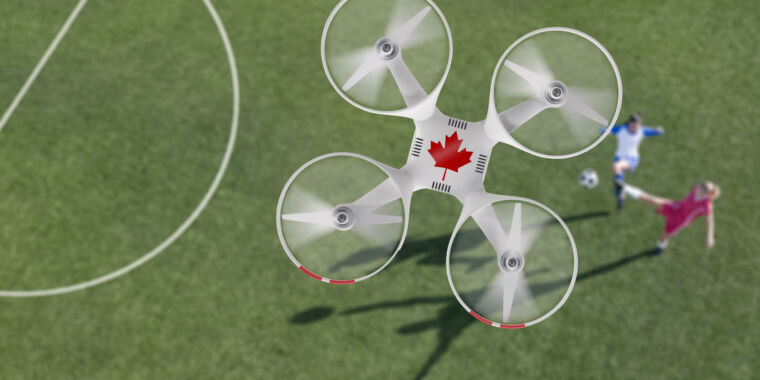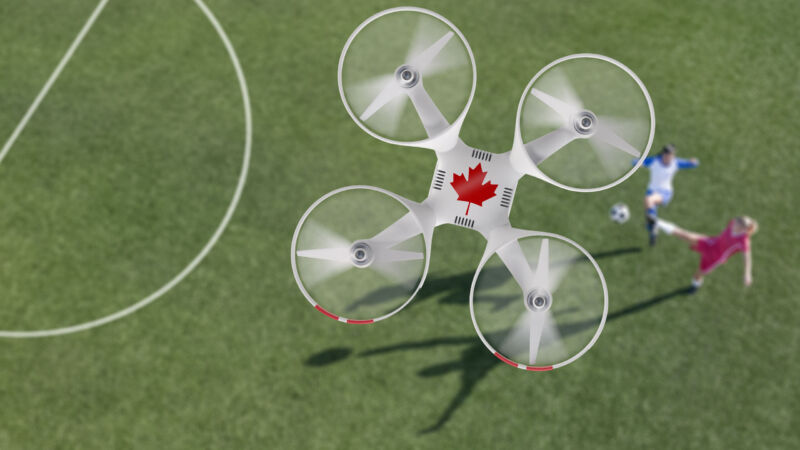Google pulls its terrible pro-AI “Dear Sydney” ad after backlash
Gemini, write me a fan letter! —
Taking the “human” out of “human communication.”
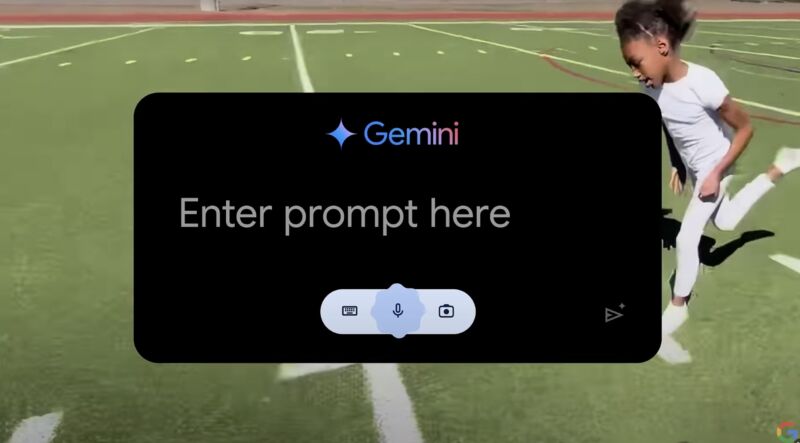
Enlarge / The Gemini prompt box in the “Dear Sydney” ad.
Have you seen Google’s “Dear Sydney” ad? The one where a young girl wants to write a fan letter to Olympic hurdler Sydney McLaughlin-Levrone? To which the girl’s dad responds that he is “pretty good with words but this has to be just right”? And so, to be just right, he suggests that the daughter get Google’s Gemini AI to write a first draft of the letter?
If you’re watching the Olympics, you have undoubtedly seen it—because the ad has been everywhere. Until today. After a string of negative commentary about the ad’s dystopian implications, Google has pulled the “Dear Sydney” ad from TV. In a statement to The Hollywood Reporter, the company said, “While the ad tested well before airing, given the feedback, we have decided to phase the ad out of our Olympics rotation.”
The backlash was similar to that against Apple’s recent ad in which an enormous hydraulic press crushed TVs, musical instruments, record players, paint cans, sculptures, and even emoji into… the newest model of the iPad. Apple apparently wanted to show just how much creative and entertainment potential the iPad held; critics read the ad as a warning image about the destruction of human creativity in a technological age. Apple apologized soon after.
Now Google has stepped on the same land mine. Not only is AI coming for human creativity, the “Dear Sydney” ad suggests—but it won’t even leave space for the charming imperfections of a child’s fan letter to an athlete. Instead, AI will provide the template, just as it will likely provide the template for the athlete’s response, leading to a nightmare scenario in which huge swathes of human communication have the “human” part stripped right out.
“Very bad”
The generally hostile tone of the commentary to the new ad was captured by Alexandra Petri’s Washington Post column on the ad, which Petri labeled “very bad.”
This ad makes me want to throw a sledgehammer into the television every time I see it. Given the choice between watching this ad and watching the ad about how I need to be giving money NOW to make certain that dogs do not perish in the snow, I would have to think long and hard. It’s one of those ads that makes you think, perhaps evolution was a mistake and our ancestor should never have left the sea. This could be slight hyperbole but only slight!
If you haven’t seen this ad, you are leading a blessed existence and I wish to trade places with you.
A TechCrunch piece said that it was “hard to think of anything that communicates heartfelt inspiration less than instructing an AI to tell someone how inspiring they are.”
Shelly Palmer, a Syracuse University professor and marketing consultant, wrote that the ad’s basic mistake was overestimating “AI’s ability to understand and convey the nuances of human emotions and thoughts.” Palmer would rather have a “heartfelt message over a grammatically correct, AI-generated message any day,” he said. He then added:
I received just such a heartfelt message from a reader years ago. It was a single line email about a blog post I had just written: “Shelly, you’re to [sic] stupid to own a smart phone.” I love this painfully ironic email so much, I have it framed on the wall in my office. It was honest, direct, and probably accurate.
But his conclusion was far more serious. “I flatly reject the future that Google is advertising,” Palmer wrote. “I want to live in a culturally diverse world where billions of individuals use AI to amplify their human skills, not in a world where we are used by AI pretending to be human.”
Things got saltier from there. NPR host Linda Holmes wrote on social media:
This commercial showing somebody having a child use AI to write a fan letter to her hero SUCKS. Obviously there are special circumstances and people who need help, but as a general “look how cool, she didn’t even have to write anything herself!” story, it SUCKS. Who wants an AI-written fan letter?? I promise you, if they’re able, the words your kid can put together will be more meaningful than anything a prompt can spit out. And finally: A fan letter is a great way for a kid to learn to write! If you encourage kids to run to AI to spit out words because their writing isn’t great yet, how are they supposed to learn? Sit down with your kid and write the letter with them! I’m just so grossed out by the entire thing.
The Atlantic was more succinct with its headline: “Google Wins the Gold Medal for Worst Olympic Ad.”
All of this largely tracks with our own take on the ad, which Ars Technica’s Kyle Orland called a “grim” vision of the future. “I want AI-powered tools to automate the most boring, mundane tasks in my life, giving me more time to spend on creative, life-affirming moments with my family,” he wrote. “Google’s ad seems to imply that these life-affirming moments are also something to be avoided—or at least made pleasingly more efficient—through the use of AI.”
Getting people excited about their own obsolescence and addiction is a tough sell, so I don’t envy the marketers who have to hawk Big Tech’s biggest products in a climate of suspicion and hostility toward everything from AI to screen time to social media to data collection. I’m sure the marketers will find a way—but clearly “Dear Sydney” isn’t it.
Google pulls its terrible pro-AI “Dear Sydney” ad after backlash Read More »
